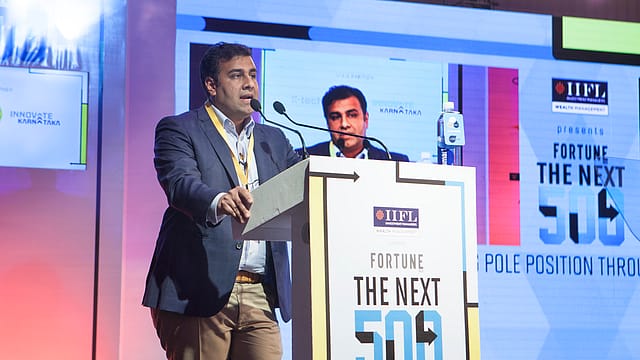Reinvention helped Arvind stay in business for so long
ADVERTISEMENT

In a world which is changing rapidly with the global political climate at its most uncertain, and science and technology bouncing forward at the speed of light, textile major Arvind Limited executive director Punit Lalbhai feels that retaining pole position has become harder in the current context.
Speaking at the Fortune India Next 500 annual summit on Friday, Lalbhai said, “In the past you used to worry about your cohort of competitors. Now the bigger threat I would say is from the outside the industry—startups, collaborations, world becoming smaller. People who would normally not be competition are now competition. So, it’s hard.”
But for Lalbhai, therein lies the opportunity as well. Talking about Arvind’s journey so far, he looked back at how how ‘reinvention’ helped Arvind Limited stray in business since its first textile mill started in 1897.
In the 1980’s Ahmedabad saw a dramatic dry off of the textile industry. The city had more than 80 composite mills at that time. But that number, within a matter of a decade went down to four.
“We were one of the four to survive. At that time, we were the first ones to introduce denims to India. We saw that India had cotton availability, competitively priced labor and fairly depreciated currency. And we took advantage of that by spotting that trend,” Lalbhai said.
“We changed ourselves from dhoti and saree manufacturer to one of the largest denim manufacturers in the world.”
Another reinvention that Lalbhai talked about was from 1996 when his family’s company ventured in the space of other modern textiles—knits, yarn, dye etc.
“That experience almost killed us,” he said. As the global economic situation worsened, Arvind found itself getting embroiled into a debt trap. But they were able to learn from that and in Lalbhai’s words risk mitigation was the key factor that made Arvind stronger.
The next phase of reinvention came in the early 2000s when the company pivoted towards a brand. This was when they saw India becoming a consumer economy as its and purchasing power grew.
“And if I think to the current time, we’re in the phase of another reinvention as well. We are branching out and taking textiles to the domain of advance materials. So, how can our textile knowledge fuel India’s growth in building and construction, in transportation, in aviation, in all kinds of allied spaces where tech and intellectual property will reign supreme,” he said.
January 2026
Netflix, which has been in India for a decade, has successfully struck a balance between high-class premium content and pricing that attracts a range of customers. Find out how the U.S. streaming giant evolved in India, plus an exclusive interview with CEO Ted Sarandos. Also read about the Best Investments for 2026, and how rising growth and easing inflation will come in handy for finance minister Nirmala Sitharaman as she prepares Budget 2026.
According to Lalbhai, the four mantra's for Arvind's success are the nimbleness of its business model, technology, sustainability, and people. He said that Arvind is exploring changing the manufacturing processes through robotics and exploring how to cut down and re-imagine the way textiles are manufactured. The company is also working with artificial intelligence to predict what trend will be prominent in tomorrow’s consumer domain.
“We have to create structures to collaborate with industry, not only industry but also universities. It means we spend a lot of time thinking about tomorrow,” he said. “We are working on a sustainable future so that all of us have ample resources to grow our businesses," he added.
Lalbhai concluded his speech by mentioning the final mantra that Arvind follows—people. He said that it is important to work extra hard to attract the best talent that’s going to navigate our companies in this uncertain and fast changing environment.
